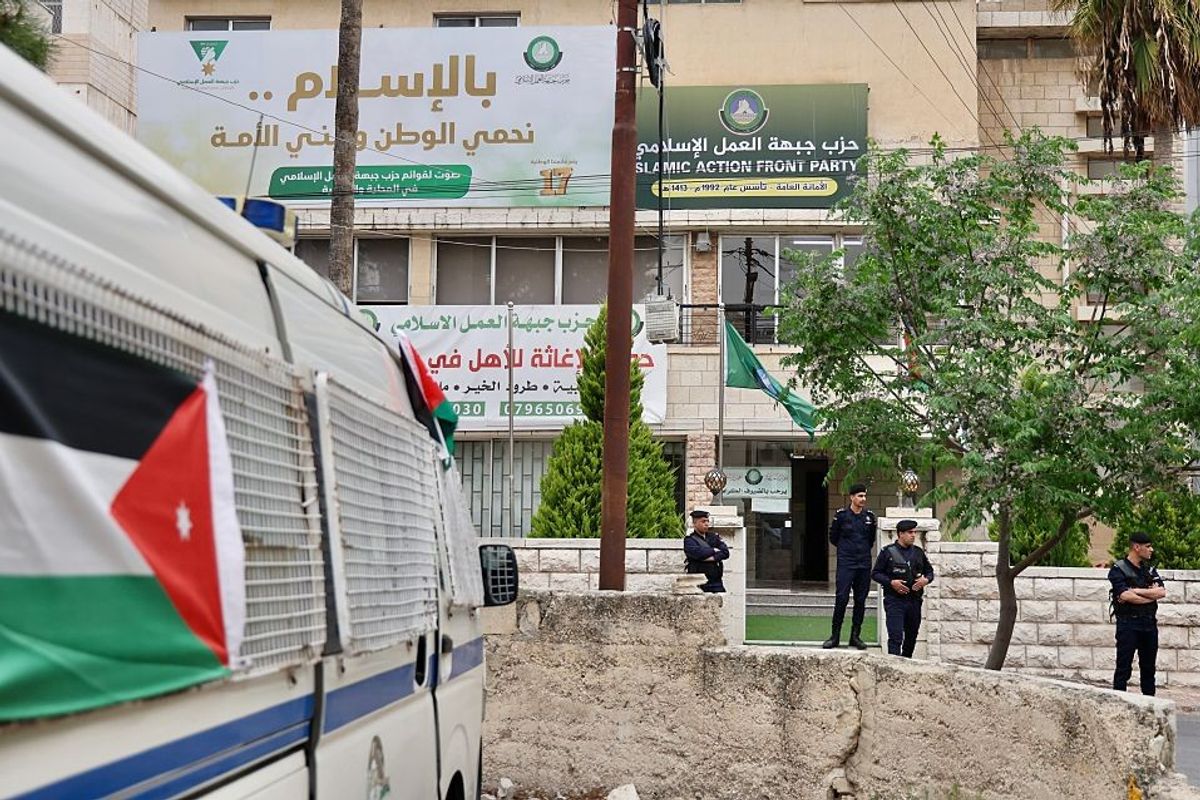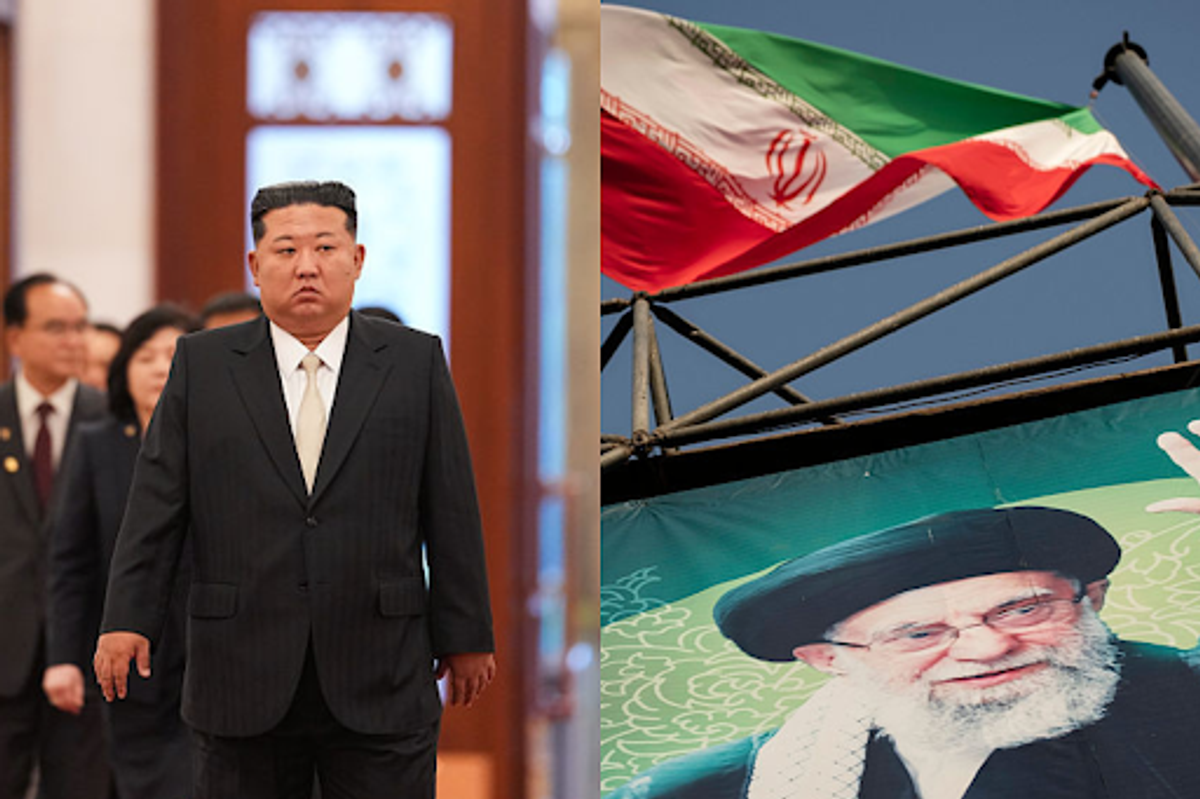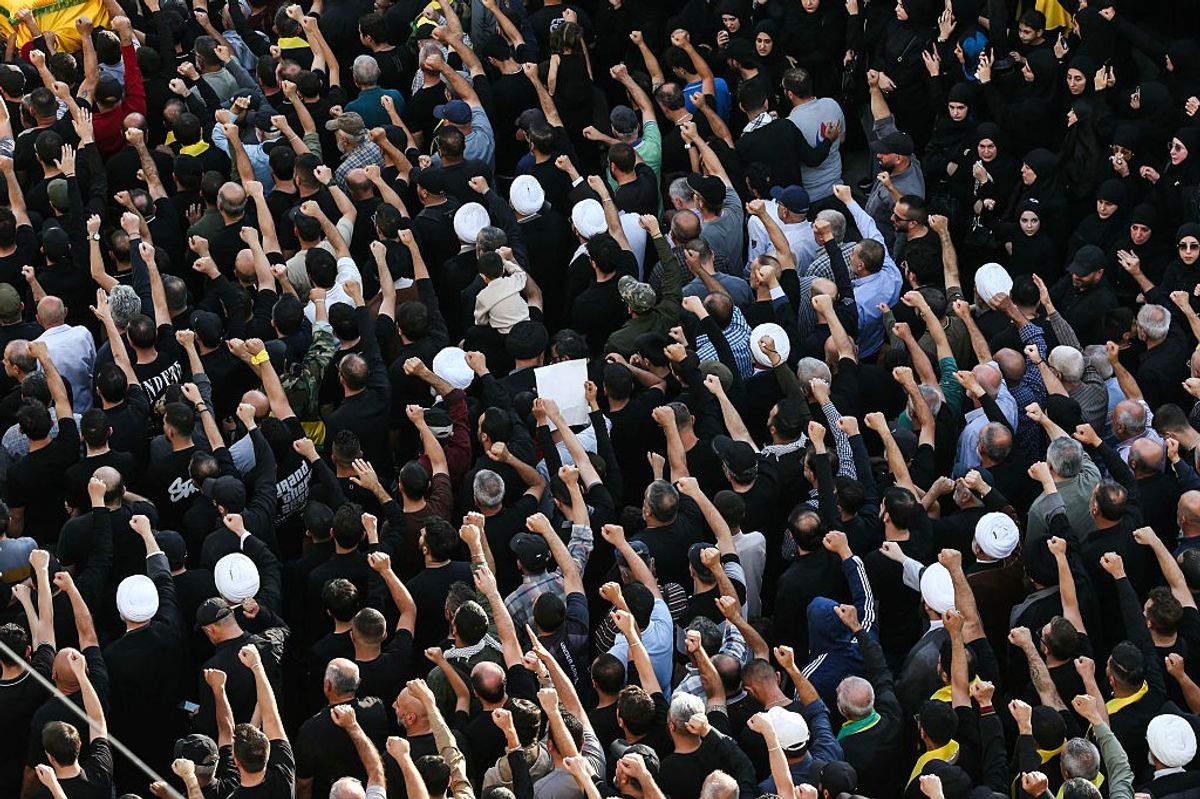EXPERT ANALYSIS — Since the October 7 Hamas massacre in southern Israel, and the Israeli war on Hamas that followed, the U.S. and other countries have worried that Israel might open a second front against another arch enemy: Hezbollah in Lebanon. Over the past ten days, the Israelis have done exactly that – beginning with the exploding pagers and walkie-talkies that took three dozen lives and wounded more than three thousand people last week, and now a bombing campaign that has struck hundreds of Hezbollah targets, taking out military assets but also killing many Lebanese civilians. On Friday, the Israel Defence Forces said an airstrike in Beirut had targeted Hezbollah’s “central command center,” killing the commander of Hezbollah's Missile Unit in south Lebanon, Muhammad Ali Ismail. There were conflicting reports about the fate of the Hezbollah leader, Hassan Nasrallah.
An Israeli source called Friday's attack the largest strike against Beirut since the 2006 Israeli war in Lebanon, and Israeli officials are warning that an Israeli ground invasion may come next. As news of the Beirut strike spread Friday, U.S. Secretary of State Antony Blinken warned that the region faced "a precarious moment...with profound consequences for its people now and possibly for years to come."
Earlier Friday, at the United Nations, Israeli Prime Minister Benjamin Netanyahu said his country “will not stop” the attacks on Hezbollah until “we achieve all our objectives.” Israel’s main objective is to make northern Israel safe for some 70,000 residents who evacuated their homes after the October 7 attacks. Experts are divided as to how long that may take – and whether it’s even possible in the long run.
After nearly a year of global diplomacy devoted to securing a ceasefire in Gaza, the U.S. and others are now scrambling to halt the fighting between Israel and Hezbollah. But Netanyahu is defiant; Nasrallah, the Hezbollah leader, said earlier in the week that the group would not halt its attacks until Israel stops his war in Gaza; and Iran, the principal backer of both Hezbollah and Hamas, is warning of a regional conflagration. In his speech to the United Nations General Assembly this week, newly minted President Masoud Pezeshkian said the fighting in Lebanon risked an “all-out conflict,” and “a point where we do not wish to go.”
Taken together, the latest developments have left even seasoned experts wondering how the next phases of the conflict may unfold. “I don't think there's ever been a time when it's been more difficult to predict where events will go in the Middle East,” former six-time CIA station chief Ralph Goff told The Cipher Brief.
We turned to two Cipher Brief experts with extensive experience in the region – the CIA’s Goff, and former U.S. Ambassador to Oman Gary Grappo – for their views on the Israeli war against Hezbollah and what may lie ahead for Lebanon and the region writ large.
THE CONTEXT
- Lebanon’s Iran-backed Shia militia Hezbollah began firing rockets, missiles and drones into northern Israel in support of Hamas in the aftermath of Hamas' October 7 attack against Israel.
- Tens of thousands of civilians have been displaced by the cross-border fighting in both Lebanon and Israel. Around 60,000 people have been displaced from homes in northern Israel, according to officials. The U.N. refugee agency UNRWA says around 200,000 people have been displaced in Lebanon—some 110,000 between October 2023 and September 17, 2024, and over 90,000 since September 17 alone.
- Earlier this month, Israel declared stopping Hezbollah’s attacks and returning displaced residents to their homes in northern Israel as official war aims. Previous goals had been limited to the campaign against Hamas and the return of hostages from Gaza.
- In the last week, Israel has launched hundreds of airstrikes on Hezbollah targets in Lebanon, the most intense since the 2006 Lebanon War. An Israeli airstrike on Beirut on Friday reportedly hit Hezbollah’s headquarters in the Lebanese capital, targeting the group’s leader, Hassan Nasrallah. This week’s strikes have killed almost 700 people, according to Lebanon’s health ministry.
- Earlier this month, Israel carried out a major sabotage attack against Hezbollah in which it planted explosives in pagers and walkie-talkies used by the group’s fighters and then detonated the devices. The explosions killed at least 42 people and injured thousands more.
- There are concerns that Israel’s next step in its campaign against Hezbollah is a ground invasion of Lebanon. IDF Chief of the General Staff Herzi Halevi said this week that the airstrikes were meant “to prepare the ground” for the “possible entry” of Israeli troops.
These interviews have been edited for length and clarity.
The Cipher Brief: What is the Israeli mission here – and do you believe it can be accomplished?
Grappo: The Israelis want to create a buffer zone between their northern border and the Hezbollah presence in southern Lebanon. Under a U.N. Security Council resolution passed at the end of the 2006 war, the Hezbollah forces were required to withdraw to the Litani River in Lebanon, which is roughly 25 kilometers (15 miles) north of that border. Hezbollah ultimately did not abide by the resolution.
I don't think the Israelis would have to have that much of a buffer to feel comfortable. My guess is that a minimum of five and probably more like 10 kilometers of a buffer zone, where there are no Hezbollah forces present and Hezbollah does not have the ability to fire rockets or missiles from some of the hilltops which have line of sight into Israel, would suffice.
The question remains how they're going to do that. At the moment, they seem to be relying on air attacks as well as drones, rockets, and artillery as well, but not a frontal assault in Lebanon itself. But that option remains very much on the table, particularly in light of comments by the Israeli military commander that orders have been given to Israeli forces to prepare for a possible invasion of southern Lebanon.
One has to wonder whether the residents of Northern Israel would ever feel safe, considering the threat that Hezbollah poses even at a distance. But nevertheless, that's the immediate objective.
Goff: The Israelis have in the past had some success in pushing Hezbollah's combat capabilities back out of range and bringing quiet to the north. I think in this case, what's going to matter is just how much combat capability from Hezbollah the Israelis can exhaust, in terms of the question of whether they can bring peace to the north or not.
The Cipher Brief: Is a ground invasion imminent? And is a ground operation necessary for Israel to achieve its goals?
Grappo: I think in order to have the level of certainty they would like to have that the southern area of Lebanon does not pose a threat, the Israelis might feel they have to carry out a ground invasion of the south. That's not to say that they could not achieve the same objective without doing that.
But they're preparing for the ground option. And of course, that will then put this on a much different level. And my suspicion is that at that point, Hezbollah will begin an all-out war against Israel, in the sense of dramatically increasing the number of missiles and rockets and drone attacks on Israel proper all over the country, and not just in certain targeted areas, which they've actually begun to do in sporadic fashion.
Goff: I think there are several worries here. One for the Israelis is far higher casualties. Going into southern Lebanon has never been an easy endeavor. And it's never really worked out that well for the Israelis. Going back to prior incursions, each time the Israelis go in, they kind of achieve what they set out to do, which is to push Hezbollah back and destroy Hezbollah’s combat forces. But every time, it causes a lot of pain and heartbreak back in Israel because of the casualties. It’s a small country, where what might seem to the West as small numbers of casualties really resonate inside Israel.
And meanwhile, there are signs that Hezbollah, among the survivors of the military leadership there, that there are a lot of them that are spoiling for a fight. They look at a ground incursion as the great equalizer between their forces and the Israelis. And while the Lebanese people will be caught in the crossfire and will surely be made to suffer, Hezbollah, I think, may welcome an incursion.
But I don't think Israel has to do it. And a part of me sees this the Israeli messaging, the army chief of staff out with the troops, talking publicly about a ground operation, and preparing them – it almost seemed like a disinformation campaign. Signaling, like in boxing - you signal with your left and then knock your foe out with the right - and I’m wondering if this is the case here, where they're trying to convince Hezbollah that they're coming in with a land attack but they're going to just ramp up the targeting from what has so far been a very successful air campaign.
Hezbollah still has a lot of missiles and rockets in their inventory, but the Israelis have shown a remarkable capability to knock them out in flight, like the ballistic missile that was reportedly headed for Mossad headquarters. And then of course, within minutes the Israeli Air Force is bombing the locations from where those rockets are fired.
The Cipher Brief: Israel officials have used the phrase “de-escalation through escalation” to describe what they are doing in the current campaign against Hezbollah. How do you understand that term?
Grappo: Well this has been tried before. Sometimes it has worked. And I'm not referring necessarily to just this particular conflict, but in other conflicts – you escalate in order to de-escalate. In this case, perhaps Hezbollah will see the very real threat that Israel poses to it – and Israel has demonstrated the capability for doing much worse – and then Hezbollah then decides to perhaps withdraw from this buffer area that Israel would like to have.
But you could just as easily make the case that this is escalation that leads to more escalation. And at the moment, neither Hezbollah nor the other members of the Axis of Resistance seem to be willing to back down.
Goff: This has become another one of those new catchphrases – along with “escalate to de-escalate,” or “escalation dominance.” I heard a lot of that talk when I was in the Middle East, and yes, the Israelis can achieve a de-escalation in the short term, but this is an area where grudges and memories last a long time. And so the Israelis may be successful in achieving some sort of de-escalation in the short term, but they'll be leaving an enemy that's spoiling for revenge at some point, which means that future escalation would be the norm there.
One thing I think a lot of us learned during the war on terror is, You can't kill your way out of a problem. That's a short-term solution. It gives you a tactical advantage, but strategically, you've got to find a way to either vanquish your enemy or find a way to come to some sort of agreement. And I don't see either outcome happening at present.
The Cipher Brief: What impact did the pager and walkie-talkie attacks have on Hezbollah’s ability to communicate, and defend itself?
Grappo: I don't believe Hezbollah anticipated that they would have to confront an attack of this nature. In fact, I'm 100 % certain they did not anticipate something like this. It is most definitely very devastating, not only to their communication system as well, but even to their psyche, their level of confidence.
Now they're not trusting any communication system that they have, which complicates any response that they may want to initiate against Israel. How do you coordinate the various elements of their army in a response to Israel in terms of what it's doing now, but even more so if Israel were to launch a ground invasion? Their confidence level, I think, has taken a huge hit.
The ripple effects of this are so extraordinary that the Islamic Revolutionary Guard Corps in Iran has launched an investigation to identify spies and traitors within their ranks. So that's what this attack has sparked among Israel's enemies. And in that vein, I would say this has been extraordinarily successful.
Goff: The pager attack took them completely by surprise. That was as brilliant a supply chain operation as I can think of in my long career. The Israelis are good at that, but in this one, they took it to a whole new level. Not only did they control the supply chain, they controlled the production. If some of the reporting is to be believed, they actually produced the devices. So they didn't just sneak into the supply chain, they took it over.
Grappo: There's a downside to this, and I don't know how much thought the Israelis gave to this. All along, Yahya Sinwar, the leader of Hamas, has been hoping and praying that his war against Israel expands to a broader regional war. Well, it's about ready to do that.
Israel, of course, felt a force to act on this capability that it had of having penetrated the communication systems, specifically the Hezbollah pagers and walkie-talkies. Upon learning that perhaps this information had been learned by some elements with Hezbollah, they felt obliged to either use this very substantial tactical advantage or lose it. But by using it the way they did, they have certainly escalated the war and have played into the hands of Sinwar, whose only hope for survival in his war against Israel is a broader Middle East war. It was known at the outset that there was just simply no way Hamas was going to defeat Israel. Just a question of how much damage they could inflict, and how long it would take for Israel to contain Hamas. So now the war has escalated and Sinwar has gotten his wish. And so we'll see where that leads. But this most certainly will drain a lot of Israel's resources, and it has moved the center of gravity of Israel's conflict from Hamas in Gaza to southern Lebanon, and Lebanon writ large.
The Cipher Brief: What comes next?
Goff: I don't think there's ever been a time when it's been more difficult to predict where events will go in the Middle East. The Iranians, usually they're the ones rattling the sabers the loudest. A friend of mine recently made the observation that lately it seems like the Iranians have been behaving more responsibly than Israeli Prime Minister Bibi Netanyahu, given that the Iranians came to New York and the new president there, Masoud Pezeshkian, said that Iran wants peace with Israel. And he offered to go back to the early stages of the nuclear agreement from 2015. Clearly, they seem to be looking for a way to de-escalate.
And meanwhile, Gaza seems to have been pushed almost entirely out of the press coverage, except for maybe the humanitarian aspects there, which are looking as dire as ever. So it's a really strange brew out there. And very hard to predict.
One possibility is the two sides gradually reach a point of exhaustion without dealing a knockout punch to either side. I think that's the more likely outcome. The other – very unlikely though – is that somehow the world community gets together and puts enough pressure on the Israelis to reach some sort of agreement.
Grappo: The United States is still pursuing some kind of a ceasefire, not only in this area, but also in Gaza. There's a lot of hope riding on that, and I don't know how probable that is right now. I'd say it's pretty improbable that they will be able to achieve either, but nevertheless, we all wish them Godspeed in those efforts. Israel isn’t on board. And I'm not sure yet that Hezbollah is prepared to back down, despite the significant losses that they have suffered over the course of the last 10 days or so, since the exploding pagers.
Read more expert-driven national security insights, perspective and analysis in The Cipher Brief.
It’s not just for the President anymore. Cipher Brief Subscriber+Members have access to their own Open Source Daily Brief, keeping you up to date on global events impacting national security. It pays to be a Subscriber+Member.














